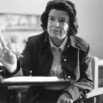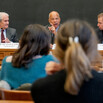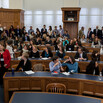CT Veteran Charged For "Homosexuality" in 1948 Sues U.S. Air Force
On November 18, 2016, Air Force veteran H. Edward Spires filed a federal lawsuit against the Secretary of the Air Force seeking to upgrade his discharge status from “undesirable” to honorable. The Air Force discharged Spires in 1948 because of his “homosexuality.”
Spires is being represented by the Veterans Legal Services Clinic at Yale Law School.
“After being cast out of the Air Force for being a gay man, Ed rarely spoke of his military service or his discharge, humiliated by the Air Force’s labeling of his service as undesirable,” said Spires’s spouse David Rosenberg, himself a U.S. Army veteran. “For the past decades he has been made to feel ashamed, despite the fact that he served his country honorably.”
Despite his faithful service in the Air Force, for nearly 70 years Spires has been ineligible for benefits from the U.S. Department of Veterans Affairs and has had to carry the shame of an “undesirable” discharge. After the repeal of “Don’t Ask, Don’t Tell” in 2010, Spires was finally eligible to apply for an upgrade of his discharge characterization, clinic students said.
Yet, when Spires applied for an upgrade from “Undesirable” to “Honorable” before the Air Force Board for Corrections of Military Records (AFBCMR) in 2014, the Board rejected his application, citing a loss of his records in a 1973 fire at the National Personnel Records Center in St. Louis. Spires applied again, with assistance from Stonewall Columbus, an Ohio LGBTQ community and advocacy center. The Air Force denied his second application in April 2016, and then decided to reconsider the matter sometime thereafter, but has neither made a decision nor indicated when it will do so, according to the clinic. The lawsuit challenges the Board’s failure to grant Spires a discharge upgrade as violative of the Administrative Procedure Act and the Due Process Clause of the Fifth Amendment.
Senator Blumenthal ’73 spoke out against the injustice that Spires and other gay veterans face in the denial of their discharge upgrades:
“Mr. Spires served our country with dignity and distinction and his record should reflect that. Passage of the Don’t Ask Don’t Tell Repeal Act marked an historic milestone for our military and for equality in America, but was only the beginning of the work we must accomplish to repair the horrible damage to so many veterans caused by decades of discrimination. I have urged the Department of Defense to expedite review of Mr. Spires case, and welcome action taken today by Yale’s law clinic to compel them to do so. While Mr. Spires is receiving expert help with his case, there may be thousands of others across the country who are encountering the same difficulties. The veterans who served during a period of time when discrimination based on sexual orientation was the most severe also face the obstacle of lost or destroyed records. This is no excuse for denying them their right to an honorable discharge, and the Department of Defense needs to ensure they receive fair consideration for their service to our nation.”
Spires enlisted in the U.S. Air Force in 1946. He served as a Chaplain’s Assistant at Lackland Air Force Base tasked, among other things, with helping the chaplain on base write letters home to distressed parents and setting up the chapel for services. In 1948, after attending an off-base Halloween party where other service members saw him, his Air Force command accused Spires of being gay, according to the clinic. They subjected him to days of interrogation, pressuring him to out other members of his unit, and threatening to put him in jail. Spires refused to cooperate and was subsequently discharged from the Air Force with an Undesirable discharge for “homosexuality.”
Spires is 91 years old and in poor health—he nearly died several weeks ago while in the intensive care unit for pneumonia, according to students from the clinic. Upon his death, Spires wishes to have a military funeral, which the Department of Defense will not grant him without a discharge upgrade, students said.
“By granting Mr. Spires' justice, the Air Force will finally send the message to Mr. Spires and all veterans who received undesirable discharges for homosexuality, despite their faithful service to our country, that the honor of their service does not depend upon their sexual orientation,” said Erin Baldwin ’17, one of the law student interns representing Mr. Spires at the Yale Law School Veterans Legal Services Clinic.
*Update: In January 2017, Mr. Spires received an honorable discharge.


